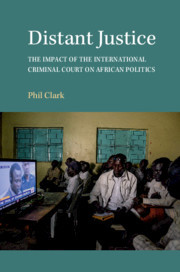Distant Justice The Impact of the International Criminal Court on African Politics
Langue : Anglais
Auteur : Clark Phil

Following the controversy stirred by the International Criminal Court (ICC) in Africa, Clark analyses its multi-level impact on national politics and ordinary communities.
There are a number of controversies surrounding the International Criminal Court (ICC) in Africa. Critics have charged it with neo-colonial meddling in African affairs, accusing it of undermining national sovereignty and domestic attempts to resolve armed conflict. Here, based on 650 interviews over 11 years, Phil Clark critically assesses the politics of the ICC in Uganda and the Democratic Republic of Congo, focusing particularly on the Court's multi-level impact on national politics and the lives of everyday citizens. He explores the ICC's effects on peace negotiations, national elections, domestic judicial reform, amnesty processes, combatant demobilisation and community-level accountability and reconciliation. In attempting to distance itself from African conflict zones geographically, philosophically and procedurally, Clark also reveals that the ICC has become more politicised and damaging to African polities, requiring a substantial rethink of the approaches and ideas that underpin the ICC's practice of distant justice.
1. Introduction: the warlord in the forecourt; 2. Court between two poles: conceptualising 'complementarity' and 'distance'; 3. Who pulls the strings? The ICC's relations with states; 4. In whose name? The ICC's relations with affected communities; 5. When courts collide: the ICC and domestic prosecutions; 6. Peace versus justice Redux: the ICC, amnesties and peace negotiations; 7. The ICC and community-based responses to atrocity; 8. Continental patterns: assessing the ICC's impact in the remaining African situations; 9. Conclusion: narrowing the distance.
Phil Clark is a Reader in Comparative and International Politics at School of Oriental and African Studies, University of London. He specialises in conflict and post-conflict issues in Africa, including transitional justice, peacebuilding and reconciliation. He is also a senior research fellow at the School of Leadership at the University of Johannesburg. Previously, Dr Clark was the co-founder and convenor of Oxford Transitional Justice Research and established the Research, Policy and Higher Education programme at the Aegis Trust Rwanda. His articles have featured in the Guardian, The New York Times, the BBC and CNN websites, Foreign Affairs, Times Higher Education Supplement, Prospect, Dissent, The East African, the Australian and the Huffington Post. His last book was The Gacaca Courts, Post-Genocide Justice and Reconciliation in Rwanda: Justice without Lawyers (Cambridge, 2010). He holds a doctorate in Politics from the University of Oxford, where he studied as a Rhodes Scholar.
Date de parution : 11-2018
Ouvrage de 392 p.
15.2x22.8 cm
Disponible chez l'éditeur (délai d'approvisionnement : 14 jours).
Prix indicatif 39,35 €
Ajouter au panierDate de parution : 11-2018
Ouvrage de 392 p.
15.6x23.5 cm
Disponible chez l'éditeur (délai d'approvisionnement : 14 jours).
Prix indicatif 107,81 €
Ajouter au panierThème de Distant Justice :
© 2024 LAVOISIER S.A.S.



